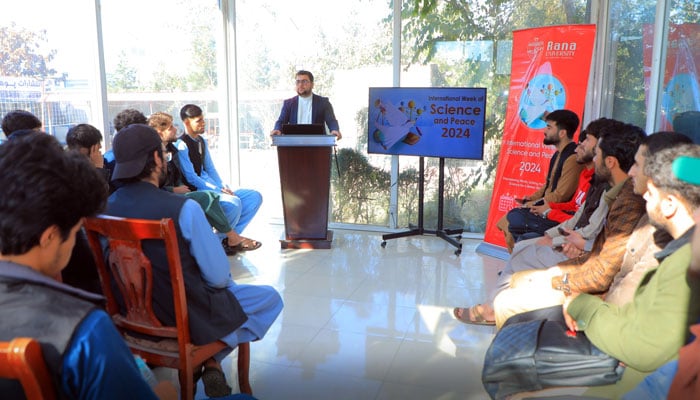First manifesto for science, peace unveiled
LAHORE:The International Week of Science and Peace (S&P) was observed from November 9 to 15, with the aim of promoting the role of science in fostering peace and encouraging the use of scientific knowledge and technology to benefit the humanity and its peaceful living on the planet.
However, it is regrettable that since the United Nations declared this week in 1986, scientists, researchers, and policymakers have largely failed to collaborate effectively in leveraging science as a tool for promoting peace and enhancing human well-being.On Monday, the local chapter of the Asia & Oceania Post-Doctoral Academia (AOPDA) issued a news release announcing the presentation of the ‘First Manifesto for Science and Peace’.
This initiative is part of the joint postdoctoral appreciations of the National Postdoctoral Academia (NPA) and the AOPDA.The release highlighted that this manifesto is the first of its kind in the four-decade history of S&P observance, clearly outlining the factors, co-factors, actors, and co-actors involved in the progressive dehumanisation of the humanity (PDH). Spearheaded by Pakistani polymath, arch-researcher and principal investigator for the AOPDA-NPA conjoint postdoctoral researches, Prof Dr Aurangzeb Hafi, the manifesto integrates all three realms and epistemic frames of humanised science.
The week was marked by the documentation and presentation of this manifesto to the global scientific and socio-cultural communities for further deliberations. According to the release, Prof Hafi, while identifying the widening gap between science and peace, introduced the term ‘Progressive Linear Decline’ (PLD) for the first time, urging scientists and peace advocates worldwide to bridge the gap. He stressed the need for practical measures to make the observance of this week truly meaningful, noting that while science continues to advance unilaterally and blindly, the pursuit of peace has been left in a dire state.
The release notes that when the UN established the International Week of Science and Peace in 1986, it was seen as a promising initiative. The week was intended to highlight the vital role of scientific research and collaboration in addressing global challenges, including conflict resolution, poverty reduction, environmental protection, and sustainable development.
However, it is deeply concerning that this initiative has failed to evolve into a practical, impactful reality over the decades.Prof Hafi attributes this failure to the absence of a clear propositional framework, a guiding manifesto, and a concrete roadmap for realising its goals. ‘Even a basic definitional framework for the initiative was never developed,’ he laments. ‘Over the past 40 years, the gap between the concepts of ‘science’ and ‘peace’ has only widened, with no meaningful intersection created between the two.’ Prof Hafi explains that science is an integrated process within the world of knowledge, yet the individuals involved in scientific inquiry and its dissemination have become increasingly disconnected from one another.
This fragmentation has led to ‘compartmentalisation’ of various scientific disciplines. According to Prof Hafi, what is often labelled as ‘specialisation’ is, in fact, a path towards compartmentalisation.
Regarding the concept of peace, the researcher argues that it cannot be compartmentalised. Peace is a holistic, composite phenomenon.‘In the human body,’ he explains, ‘how can one part be in pain while another is at peace?’ Prof Hafi expressed regret that physicists and chemists, among other scientists, have not recognised themselves as stakeholders in broader societal issues, including peace. ‘Even in prestigious academic institutions like Oxford, Cambridge, and Harvard, there is a huge lack of integration between science and peace’. —APP
-
 Blac Chyna Reveals Her New Approach To Love, Healing After Recent Heartbreak
Blac Chyna Reveals Her New Approach To Love, Healing After Recent Heartbreak -
 Royal Family's Approach To Deal With Andrew Finally Revealed
Royal Family's Approach To Deal With Andrew Finally Revealed -
 Super Bowl Weekend Deals Blow To 'Melania' Documentary's Box Office
Super Bowl Weekend Deals Blow To 'Melania' Documentary's Box Office -
 Meghan Markle Shares Glitzy Clips From Fifteen Percent Pledge Gala
Meghan Markle Shares Glitzy Clips From Fifteen Percent Pledge Gala -
 Melissa Jon Hart Explains Rare Reason Behind Not Revisting Old Roles
Melissa Jon Hart Explains Rare Reason Behind Not Revisting Old Roles -
 Meghan Markle Eyeing On ‘Queen’ As Ultimate Goal
Meghan Markle Eyeing On ‘Queen’ As Ultimate Goal -
 Kate Middleton Insists She Would Never Undermine Queen Camilla
Kate Middleton Insists She Would Never Undermine Queen Camilla -
 Japan Elects Takaichi As First Woman Prime Minister After Sweeping Vote
Japan Elects Takaichi As First Woman Prime Minister After Sweeping Vote -
 King Charles 'terrified' Andrew's Scandal Will End His Reign
King Charles 'terrified' Andrew's Scandal Will End His Reign -
 Winter Olympics 2026: Lindsey Vonn’s Olympic Comeback Ends In Devastating Downhill Crash
Winter Olympics 2026: Lindsey Vonn’s Olympic Comeback Ends In Devastating Downhill Crash -
 Adrien Brody Opens Up About His Football Fandom Amid '2026 Super Bowl'
Adrien Brody Opens Up About His Football Fandom Amid '2026 Super Bowl' -
 Barbra Streisand's Obsession With Cloning Revealed
Barbra Streisand's Obsession With Cloning Revealed -
 What Did Olivia Colman Tell Her Husband About Her Gender?
What Did Olivia Colman Tell Her Husband About Her Gender? -
 'We Were Deceived': Noam Chomsky's Wife Regrets Epstein Association
'We Were Deceived': Noam Chomsky's Wife Regrets Epstein Association -
 Patriots' WAGs Slam Cardi B Amid Plans For Super Bowl Party: She Is 'attention-seeker'
Patriots' WAGs Slam Cardi B Amid Plans For Super Bowl Party: She Is 'attention-seeker' -
 Martha Stewart On Surviving Rigorous Times Amid Upcoming Memoir Release
Martha Stewart On Surviving Rigorous Times Amid Upcoming Memoir Release




